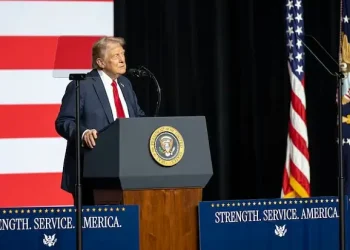The U.S. Department of Defense has introduced a policy mandating the separation of service members diagnosed with gender dysphoria unless exemptions are granted, emphasizing service in accordance with biological sex and ceasing funding for related treatments.
This move reflects ongoing debates on LGBTQ+ rights within military contexts.
The New Policy
The U.S. Department of Defense (DOD) has implemented a new policy affecting service members diagnosed with gender dysphoria. Under this policy, these individuals will be processed for separation unless they receive an exemption based on compelling government interest.
Exemptions are considered on a case-by-case basis, focusing on the necessity of retaining the service member for warfighting capabilities.
The policy underscores that all service members must serve according to their biological sex.
“It is the policy of the United States government to establish high standards for service member readiness, lethality, cohesion, honesty, humility, uniformity, and integrity,” the policy memorandum reads. “This policy is inconsistent with the medical, surgical, and mental health constraints on individuals with gender dysphoria or who have a current diagnosis or history of, or exhibit symptoms consistent with, gender dysphoria.”
Policy Implications
Former and now current President Donald Trump’s administration has influenced broader conservative trends, which include this policy change.
It contrasts with previous policies under President Joe Biden, who had overturned a ban on transgender military service.
Military and Social Dynamics
- The policy aims to enhance military readiness and cohesion by aligning service roles with biological sex.
- There is debate over whether this approach effectively improves military effectiveness or exacerbates social tensions.
- Impacted service members will receive honorable discharges unless their records suggest otherwise.
Global Perception
- This decision may influence international views on U.S. human rights and inclusivity policies.
- The shift could affect diplomatic relations where LGBTQ+ rights are a focal point in discussions.
- Countries observing U.S. policies might reassess their own stances on similar issues.
Pete Hegseth, Defense Secretary, stated in a memo that:
“service by these individuals is not in the best interests of the Military Services and is not clearly consistent with the interests of national security.”
Additional Reading
Final Thoughts
The DOD’s new policy regarding gender dysphoria among service members highlights ongoing tensions between military readiness objectives and evolving social norms around LGBTQ+ rights.
As debates continue, the implications for both domestic policies and international perceptions remain significant, shaping future discourse on inclusivity within armed forces worldwide.
Sources: US Department of Defense.
Ivan Alexander Golden, Founder of THX News™, an independent news organization dedicated to providing insightful analysis on current events, prepared this article.









